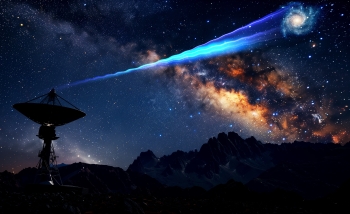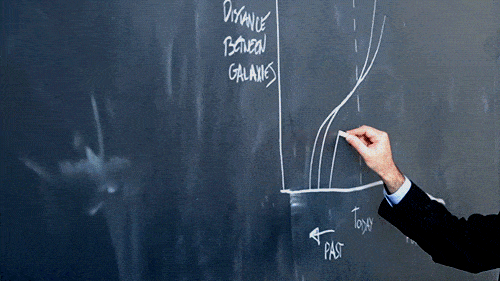It's the most wonderful (space)time of the year, but some people are just so difficult to shop for. What do you get for the person who has (a theory of) everything? Here are nine geeky gift ideas for your favourite physics fan.
1. A chunk of space-mineral forged in the cataclysmic collision of neutron stars in the far reaches of the universe
Or, as it is more commonly known, gold. If you’re shopping for a gold necklace or watch for a loved one, keep this awesome fact in mind: much of the gold in our galaxy was likely created by the cataclysmic collision of neutron stars very, very far away. Research published in The Astrophysical Journal in 2018 suggests that these incredibly violent collisions of ultra-dense collapsed stars may be responsible for the majority of gold in our universe. So you can, with some truth, tell your loved one: “I’d give you the stars.”
Price: Mildly pricey to prohibitively exorbitant
2. Schrödinger’s Cat mug
Erwin Schrödinger composed his famous “cat” thought experiment as a way to demonstrate the counter-intuitiveness of an interpretation of quantum mechanics. It proposes a cat in a box with a random-triggered dose of poison must be considered both alive and dead simultaneously until the box is opened to check. We’re assuming Schrödinger drank plenty of coffee while formulating the idea – as have generations who have pondered it since – so this mug is a fitting tribute.
Price: 25 bucks for a set of two (one alive cat, one dead)
3. Euler’s Disc
Though marketed as a toy, this spinning disc has been the subject of multiple scientific papers, since it almost seems to defy gravity. Spoiler alert: as the azimuthal rotation decreases, the disc also undergoes a decrease in amplitude amid an increase in the frequency of the disk’s axial precession senoidal curve. Plus it makes a really cool sound.
Price: $20ish
4. Chalkboard paint
Physicists are drawn to chalkboards the way a cat is drawn the black pants you just lint-rollered before work. With chalkboard paint, any room can become a canvas for calculation. Just be sure to clear it with your landlord or boss first.
Price: $15 and up
5. Perpetual motion machine... almost
What better gift for a physicist than a device that seems to defy the laws of thermodynamics? This particular machine uses solar power to keep the marble rolling, so it won’t probably work after our sun explodes in a few billion years. Great fun in the meantime, though.
Price: $50 (glue and sunlight not included)
6. Books!
Newfangled gadgetry aside, there’s still nothing quite like a good book. Here are a few of our recommendations:
- Seven Brief Lessons on Physics by Carlo Rovelli
- Women in Science: 50 Fearless Pioneers Who Changed the World by Rachel Ignotofsky
- Einstein's Unfinished Revolution: The Search for What Lies Beyond the Quantum by Lee Smolin (to be released April 9, but ready for pre-order!)
- Breakfast with Einstein: The Exotic Physics of Everyday Objects by Chad Orzel
- What If? by Randall Munroe
- The Quantum Astrologer's Handbook by Michael Brooks
- The Dialogues: Conversations about the Nature of the Universe by Clifford V. Johnson (the speaker this February in Perimeter’s Public Lecture Series -- stay in the loop for more details!)
Price: Priceless (but starting at about 10 bucks)
7. A Swiss Franc banknote
Specifically, a CHF 200 note, which bears imagery commemorating CERN and the discovery of the Higgs boson at the Large Hadron Collider. The geeky greenbacks were in introduced last August and will be phased-in over the next few years.
Cost: About CAD $270, give or take depending on market fluctuations and such
8. Rube Goldberg machine
These things are all physics. Who wouldn’t want to spend an inordinate amount of time building an unnecessarily complex contraption to perform a meaningless task? Nobody, that’s who.
Price: Cheap (homemade with popsicle sticks and a marble) to kinda pricey (this starter kit) to holy-smokes-that-must-have-taken-forever-and-cost-a-fortune
9. Free posters!
Bring beauty and inspiration to any dorm room, bedroom, office, lounge, particle accelerator, or other space where science-lovers hang out with our free posters. We’ve got posters about dark matter, black holes, pioneering women in physics, general relativity, and lots more. Did we mention they’re free?
Price: nada!
About PI
Perimeter Institute is the world’s largest research hub devoted to theoretical physics. The independent Institute was founded in 1999 to foster breakthroughs in the fundamental understanding of our universe, from the smallest particles to the entire cosmos. Research at Perimeter is motivated by the understanding that fundamental science advances human knowledge and catalyzes innovation, and that today’s theoretical physics is tomorrow’s technology. Located in the Region of Waterloo, the not-for-profit Institute is a unique public-private endeavour, including the Governments of Ontario and Canada, that enables cutting-edge research, trains the next generation of scientific pioneers, and shares the power of physics through award-winning educational outreach and public engagement.
You might be interested in












